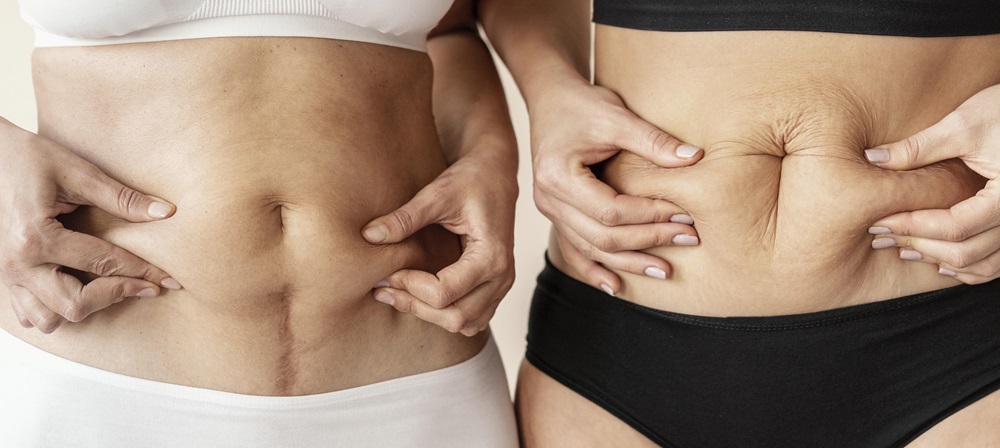Opening Hours
Mon - Thu: 10am – 6pmFri : 10am – 5pm
Sat : 10am – 4pm
If you are interested in having a tummy tuck because you want to get rid of excess fat and skin, one of your main concerns will undoubtedly be the recovery time involved.
Aside from the benefits of an improved and strengthened core and a firmer, smoother abdominal profile, you also can expect some scarring as you would with any other form of surgical procedure.
With a board-certified cosmetic surgeon and first-class aftercare, how long will it take to heal, and will the scars fade? We are going to offer answers to these important questions in this post.
Generally speaking, the recovery period can vary from patient to patient and case to case, but it is not unheard of for the incision to be fully healed within 2 to 3 months.
As you will see below, there are ways that you can quicken up and improve the healing process.
With questions like this, we must give an honest answer. Although it would be awesome to tell you that scarring will be unnoticeable, this is not realistic.
With any tummy tuck, you should expect to have a large and upside-down T shape scar running across your abdomen.
Most skilled surgeons, however, will try to make sure the incisions and tummy tuck are performed as low down on your abdomen as safely as possible to make the scarring as inconspicuous as possible.
Read more on whether you can have a baby after tummy tuck.

A qualified and experienced surgeon will always do their very best to ensure that any scarring you are left with has the best chance of healing quickly and fully.
Along with their comprehensive aftercare, there are several things you can do to take care of the incision to help the scarring heal fully after a tummy tuck.
First and foremost, you must follow the care instructions provided to you by the surgeon who performed your tummy tuck.
This should include general hygiene, pain management and wound care instructions.
While you rest up and patiently wait for your tummy tuck scarring to heal, while following the care instructions provided, you need closely monitor it for any signs of infection.
You must contact your surgeon if you feel it may be infected as this could lead to more permanent and prominent scars.
you can also see some of our tummy tuck before and afters

Topical treatments can help with swelling and scarring.
However, they are only effective if you start using topical creams and lotions at the right time.
Only when no scabs are covering the incisions can you start applying topical treatment.
By far the easiest topical treatment to use is one that contains silicone, whether it’s in the form of sheeting, cream, or gel.
Silicone can replicate the outermost layer of the skin’s occlusion properties to maintain scar tissue hydration and make sure that there is not an excessive amount of collagen produced.
Other topical treatments worth considering are any that include cocoa butter and vitamin E.
As there are not many studies into their effects, it may be that they are just good for moisturisation purposes, which indirectly can help the healing process.
Speaking of moisturising, you should start doing this as soon as the tummy tuck incisions have fully closed.
If you don’t wait, you could stop the incisions from closing fully and create the perfect place for infections to develop.
If your tummy tuck scar is irritated, it will only make it worse. Avoid clothing and products, therefore, that could aggravate things.
It may mean you need to change your routine a little and can’t wear some of your favourite outfits, but it will be worth the sacrifice when you have a slimmer and firmer abdomen and overall body shape to show off in those tighter clothes.
If you love to lie in the sun, until your scars are healed, it is best to cover them up when you are out in the sun.
If your scars are exposed too much to the UV rays of the sun, it will make the scarring thicker and darker.
Although sunscreen is great perfection, until your scarring has healed, it’s best to use clothes.
As part of the healing process, you will need to become very familiar and intimate with your incision and the subsequent scarring.
While looking after it, you will also have to monitor it, to make sure there are no signs of infections or other complications or issues.
Therefore, you should notice a change in the severity, prominence, colour and texture of the scarring.
For at least a year after your surgery, you should expect to see your abdominoplasty scarring.
If you have a lighter skin tone, the scars will turn pink in time before fading into a thinner, white line.
If you have darker skin, the scars may heal darker and more pigmented at first and then lighten and fade over time.
Of course, as we have previously noted, the extent to which the scars heal and what they look like once they are fully healed will be different from patient to patient.
Your surgeon will be able to give you a better indication of what scarring you can expect based on your case.
It is always important to weigh up the pros and cons of any surgery before signing up for it and abdominoplasty or a tummy tuck is no different.
One of the biggest concerns is the scarring that is left behind as the incision that is required is quite large and stretches across your abdomen.
It’s also worth noting that the experience and recovery time different patients have before their tummy tuck is virtually unnoticeable (if that indeed ever happens) vary.
However, as we have discussed, it is possible for the scarring to heal within 2 to 3 weeks and for the scarring to fade away almost completely within 1 year following surgery.
Posted In: Body Treatments Blogs
Written By: Dr Khalid Irshad
The journey can be hard, but if you've been inspired by our patients, get in touch.
Book a Consultation Request a Brochure










* Every patient is a unique individual and every surgery has unique aspects. Therefore, results may vary. To read our full disclaimer please click here.
Website by Link Digital